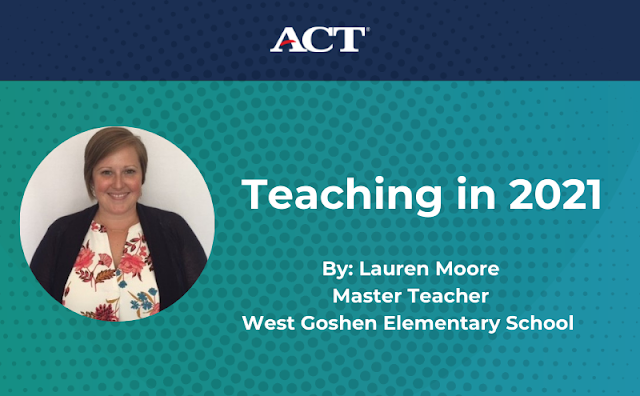By: Lauren Moore, Master Teacher, West Goshen Elementary School
The truth is a cliché. I love my job. I love being surrounded by 300 5–10-year-olds every day. I love walking into a classroom and witnessing the magic of student thinking, student ownership, growth, and meeting goals. The spark, the magic lightbulb- that’s what keeps me returning day after day, year after year. Regie Routman once charged educators to, “Focus on the children in front of you and create a genuine hope for their futures. They deserve the best of what you have to offer. You can do it!” This quote has given me hope, courage, and fortitude on many late nights and on weekends — to keep going. Keep giving my all for students.
But is that enough? Is that sustainable?
I think what this research is really asking is, is our educational system sustainable? The trends in funding, teacher retention, and teachers entering the profession are all in a downward spiral. My teacher brain immediately asks, “How do we fix this?”
The truth is, if there were a solution, it would be fixed already. Nobody knows how to fix education funding, pressure on teachers, retaining good teachers for all students, or how to attract younger generations to the profession. I don’t know either. Instead, I’d like to offer some practical ways for the education community and our broader society to counteract the bleak findings in the research and help teachers keep the spark of student learning as their driving force.
- Show genuine gratitude. Families, when you talk about or to your child’s teacher, acknowledge their hard work, their sacrifice, and their genuine care for your child. Perhaps send your child’s teacher an email or a note to say thank you. Check in on them from time to time. You don’t have to offer your time, money, or resources (although that would also be appreciated!), instead show teachers that you care about them as humans.
- Engage a broader audience. Oftentimes it seems as though educational research is only reported to educators. We know. We are living it out each day. Researchers, when reporting on or advocating for issues within education, think about who can play a role in the solution. Find ways to communicate research, articles, or issues to businesses, policymakers, communities, families, or other stakeholders who can assist with change and progress.
- Stay informed about policy. If you are a citizen who is looking to get a little more involved, become knowledgeable about what is happening within education policy. Many of the issues facing educators and students today are a direct result of federal and state policies. Do you know who your local representatives are? Do you know who is on the education committees in your state? Do you know what education laws are being considered each year?
- Tell teachers’ stories. Oftentimes the only way teachers are highlighted are in movies. These are nice, but they continue the stereotype of the educator risking their personal life, financial security, and going against administration to ultimately make a difference. There’s a reason this type of story sells— it's compelling. It also may be true. But instead, let’s highlight everyday educators for their commitment to our society’s future.
- Encourage future educators. When you hear someone expressing interest in the world of education, encourage them! Tell them about the teachers that have affected you and how! Acknowledge that there will be difficult aspects, but ultimately encourage their interest and their exploration of the education world.
Lauren Moore is master teacher at West Goshen Elementary School in Goshen, Indiana. In this role she designs and implements weekly professional development that is differentiated to meet the needs of both teachers and students at her school. Prior to becoming the master teacher, Moore taught first grade for seven years and special education for five years. During the 2018-2019 school year, Lauren was a Teach Plus Indiana Teaching Policy Fellow.
She received her Bachelor of Arts in elementary and special education from Grace College and her Master of Education in elementary education from Ball State. She is currently working on her administrative license from Indiana Wesleyan University.
